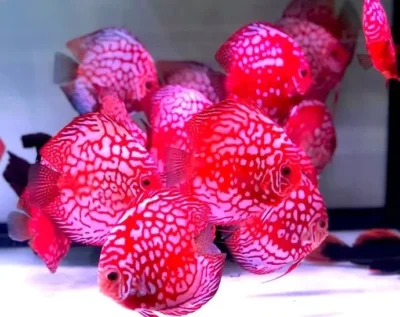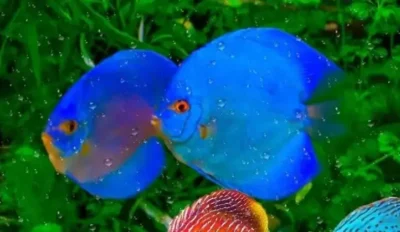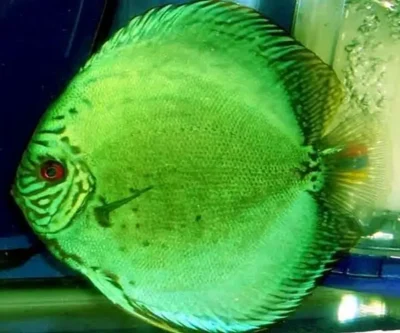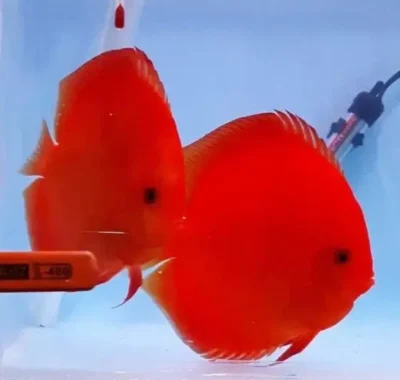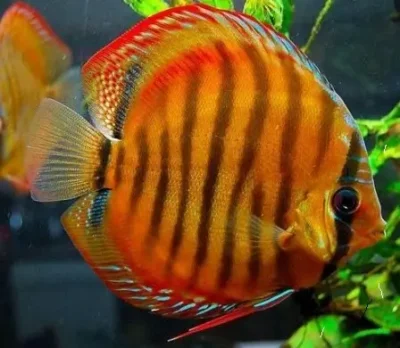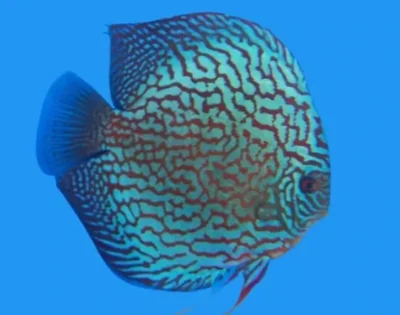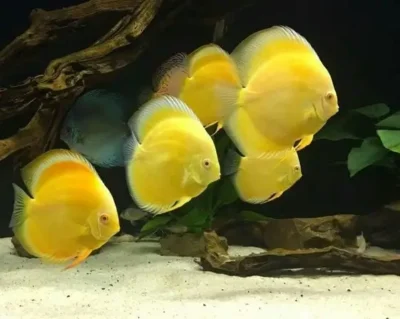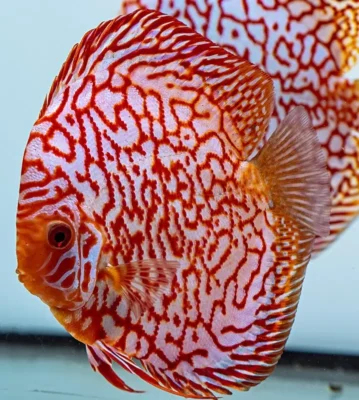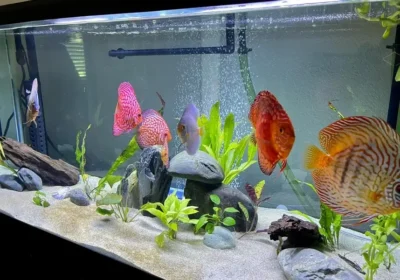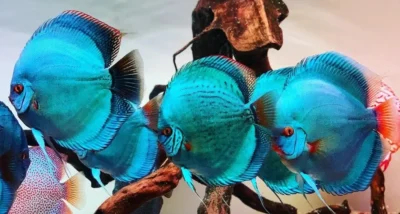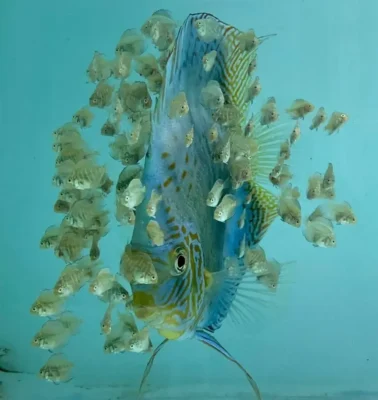Discus fish (Symphysodon spp.) are a popular, beautiful, and one of the most sought-after aquarium fish. They are known for their vibrant colors and stunning looks. Native to the Amazon River Basin in South America, Discus fish are praised for their elegance and social nature.
Discus have a circular disc-shaped body, hence their name. They come in a variety of colors, including shades of red, blue, green, brown, and more. Their coloration and patterns are more influenced by genetics, diet, and the tank’s environmental conditions. Discus fishes are considered to be an advanced level of fishkeeping due to their specific care requirements to successfully bring them up.
Let’s look at some of the stunning discus fish types, Varieties, their care, breeding, etc.
6) Discus fish water parameters
Discus Fish types:
Discus fish (Symphysodon spp.) come in various types with unique color patterns and characteristics. The discus fish varieties can be classified into different strains and color patterns. Here are some popular types of discus fish:
Heckel Discus: Known for its distinctive and classic discus shape.Typically has a red-brown base color with vertical stress bars.
Blue Discus: Exhibits a blue coloration, and there are several strains within this type.Blue discus can vary from pale blue to deeper shades.
Green Discus: It often displays a greenish hue, especially in the body. Some strains may have blue or turquoise markings.
Red Discus: They features a red coloration, and there are different strains available within this category. They may include varieties like the Red Melon Discus or Red Pigeon Blood Discus.
Brown Discus: The variations come in brown shades with some having a reddish hue. Some may exhibit iridescent stripes.
Turquoise Discus: These Discus fish come in a turquoise-blue color combination. There may be variations in the color intensity and pattern.
Yellow Discus: They Exhibit a yellow coloration. There may be variations in intensity of colors within this type.
Albino Discus or white discus: They say it lacks pigmentation and hance results in a full white appearance.
Pigeon Blood Discus: These Discus feature a vibrant red coloration. It is Known for its intense red hue.
Discus Fish for sale
Discus fish for sale is available on various online platforms, local aquarium stores, or specialized Discus aquarium shops. The availability may vary based on your location and the specific type of discus fish you need. Here are some general suggestions for finding discus fish for sale:
- Check reputable online aquarium retailers and websites that specialize in selling Discus fish.
- Explore auction websites like eBay where individuals and breeders may list discus fish for sale.
- Visit your local aquarium that specialize in selling discus fish. They may have a good selection of discus fish for sale, and the staff can provide more information on it
- Participate in online groups in Facebook dedicated to Discus aquarium enthusiasts. Members often share information about their discus fish for sale.
Before making a purchase, ensure that the seller is reputable and has positive reviews. Make sure that the fish’s health is good and be aware of shipping policies and transportation if you’re importing them.
Discus fish price:
The discus fish price can vary widely depending variety of discus, the size of the Discus fish and its.
Common Strains or standard strains of discus fish may range from $50 to $60 per fish. Colorful Varieties and High-quality ones such as Blue Diamond, Red Turquoise, or Pigeon Blood, can range from $70 to $150 or more per fish. Rare or premium varieties, like certain wild-caught species or unique colored ones can have significantly higher prices, ranging from $150 to several hundred dollars per Discus fish.
Breeding pairs of discus fish are often more expensive, and their prices can range from $200 to over $500 depending on the quality and rarity.
The size of the discus fish can also influence the price. Larger and mature discus are priced higher than the smaller juveniles.
Prices also vary based on your location, the availability of certain strains, and the reputation of the seller or breeder.
Discus fish tank size:
The tank size for discus fish depends on various factors such as the number of discus, their size, and the presence of other fish. Discus fish are known for their social nature and prefer living in groups. So, a larger tank is generally better for their well-being.
The minimum tank size for a small group of 5 to 6 matured discus fish need around 55 gallons of water. However, larger the tank the better it is.
Discus fish also swim in vertical swimming patterns. Therefore, a tank with sufficient vertical height is beneficial. A tank with a height of 20 inches and above more is preferable.
If you plan to keep a larger number of discus fish or include other tank mates you may need an even larger aquarium. Always add more plants to your Discus fish aquarium to keep the stress free.
Discus fish tank setup:
Setting up a tank for discus fish involves creating an environment that mimics their natural habitat. Here are guidelines for a discus fish tank setup:
Tank Size: Choose a sufficiently large tank to provide ample amount of swimming space for the discus fish. A tank size of at least 55 gallons is recommended for a small group 5 to 6 discus fishes.
Tank substrate: Use a soft substrate such as fine gravel or sand. Discus fish often sift through the substrate in search of food, and a soft substrate can prevent injuries to their delicate mouths.
Water Parameters: Maintain stable and suitable water parameters.Temperature: 78°F to 81°F.
pH: Slightly acidic to neutral or alkaline, preferably between 6.5 and 7.5.
General Hardness (GH): 1 to 8 dGH.
Carbonate Hardness: Below 5 dGH.
Filtration:Use a high-quality filtration system to keep the water clean and well-oxygenated. Discus fish are sensitive to ammonia and nitrite, and efficient filtration is crucial.
Decorations: Add driftwood, rocks, and plants to mimic the natural habitat of discus fish. Live plants, such as Amazon swords, Vallisneria, and Anubias, can provide hiding spaces and contribute to a natural aesthetics.
Lighting: Provide subdued lighting. Discus fish come from shaded areas in their natural habitat, and too much bright light can stress them.
Tank Mates: Choose compatible tank mates that are peaceful. Avoid aggressive fish species.
Heating: Use a reliable heater to maintain the desired temperature between 78°F to 81°F. Discus fish are sensitive to temperature fluctuations.
Water Changes: Regular water changes are essential for maintaining water quality. Discus fish benefit from more frequent and larger water changes, often around 50% at a frequency of 10 to 15 days.
Discus fish water parameters:
Discus fish are sensitive to water conditions, and maintaining appropriate water parameters is crucial for their health. The recommended water parameters for Discus fish:
Temperature: Discus fish prefer water temperatures between 78°F to 81°F. Adding lot of plants to the aquarium would get you the ideal temperature for Discus fish. A stable temperature with minimum amount of temperature fluctuations should be maintained.
pH Level: The pH level for discus fish is generally recommended to be in the slightly acidic to slightly alkaline or neutral range is recommended . Maintain a pH between 6.5 and 7.5. Some discus keepers prefer a pH closer to 7 for optimal conditions.
Water Hardness: Discus fish generally thrive in soft water conditions. The general hardness (GH) to be between 1 and 8 dGH. The carbonate hardness should be ideally below 6 dGH.
Ammonia and Nitrite: Ideally Ammonia and nitrite levels should be maintained at zero or as low as possible. Both Ammonia and nitrite are toxic to any fresh water fish. Regular 30% water changes a week or a good filtration system is essential to prevent the buildup of Ammonia and nitrite. If you have a good filtration system you can do 30% water change once in 10 to 15 days.
Nitrate Levels: Nitrate levels should be kept as low as possible. Nitrate concentrations below 20 ppm is recommended. Regular water changes and proper filtration help control nitrate levels.
Water Filtration: Provide efficient and gentle filtration to ensure good water quality. Discus fish should be kept in a clean and well-oxygenated water. Avoid strong water currents as discus fish are not strong swimmers and may be stressed by strong currents.
Discus fish lifespan:
The lifespan of discus fish varies on factors such as their environment, care, genetics, and overall health. In well-maintained aquariums with proper care, discus fish can live for a relatively long time. On an average, discus fish have a lifespan of around 10 to 15 years. Some Discus fish may live even longer if it is maintained in optimal conditions.
Some of Key factors that influence the lifespan of discus fish:
Water Quality: Discus fish are sensitive to water conditions. Maintaining clean and stable water parameters is essential for their health and longevity. Regular water changes, proper filtration, and monitoring water parameters are crucial.
Diet: Providing a well-balanced and nutritious diet is important for the overall health of discus fish. Provide them a varied diet that includes high-quality pellets, frozen or live foods for their well-being.
Tank Size: A sufficiently sized aquarium is important for the well-being of discus fish. A larger tank provides more swimming space and helps reduce stress. Adding a few plants to the tanks reduces stress on Discus fish.
Genetics: Like any fish the genetic background of discus fish can influence their longevity. Purchasing discus from reputable breeders ensures a good vigor and disease-free Discus fish. This can ensure a likelihood of a longer lifespan.
Stress and Compatibility: Minimizing stress and providing a peaceful environment are crucial for the wellbeing of Discus fish. Choosing compatible tank mates, avoiding aggressive fishes, and minimizing disruptions in the aquarium can keep the stress levels lower for a Discus fish.
Discus fish tank mates:
Discus fish are a peace loving, gentle and soft. So, it is crucial to ensure a harmonious and social aquarium environment. Discus fish are known for their calm temperament and are very sensitive to the behavior of their tankmates.
Here are some compatible tank mates for discus fish:
Tetras:
- Neon tetras
- Cardinal tetras
- Rummy nose tetras
Corydoras Catfish:
Various species of Corydoras catfish, such as Corydoras panda, can coexist peacefully with discus.
Angelfish:
Angelfish are good tank mates for Discus fish, but monitor their behavior as they grow bigger. Avoid keeping overly aggressive angelfish.
Dwarf Cichlids:
Some dwarf cichlids, like Apistogramma species, can be suitable tank mates for Discus fish if the aquarium is spacious enough.
Bottom Dwellers:
Bottom-dwelling fish like Bristlenose plecos or other small plecos can be added.
Gourami’s:
Peaceful gourami’s, such as honey gourami’s, can live well with discus.
Rainbowfish:
Some rainbowfish species, such as Bosemani rainbowfish, can be suitable if the tank is large enough. Always consider the size of the tank, water parameters, and the specific needs of each species when planning a community tank with discus. Avoid keeping aggressive or fin-nipping fishes.
How big do Discus fish get?
The size of discus fish can vary based on factors such as genetics, diet, and Tank size. An adult discus fish can have a body diameter ranging from 4 to 8 inches. The size can vary among different strains and varieties. Larger tank size and regular high-quality diet can ensure growth up to 8 inches.
Large Discus fish:
The juveniles Discus fish is usually starting around 1.5 to 2 inches in size even smaller depending on their age.
The growth rate of discus fish varies on the frequency of diet, tanks size and their genetics. Generally, the growth rate of Discus fish is higher in larger tanks.
Discus fish breeding:
Breeding discus fish is rewarding and interesting. Discus lay eggs and the eggs are hatched by the males. The breeding process involves in the males chasing the female, the female laying eggs and the males fertilizing the eggs through their sperm. You need to set up the best water conditions, good diet and a happy atmosphere to encourage Discuss fish mate and breed. Here are some steps to be taken into consideration for breeding Discus Fish:
Setting Up the Breeding Tank and choosing breeding pairs:
Use a separate tank for breeding, preferably around 50 gallons for 5 discuss fish. Have 4 males and 2 females in the tank. Provide a soft substrate, such as sand, for the discus to lay eggs on. Include hiding spots like plants, PVC pipes and driftwood to create a sense of security as well as mimicking their natural habitat. Ensure that the lighting conditions mimic a natural day-night cycle.
Look for the fish with vibrant colors with well-defined markings, and a good round shape. Ensure that the selected pairs are compatible to each other.
Breeding tank Water parameters:
Maintain the water temperature between 78-81°F. Keep the pH level slightly acidic, around 6.0 to 6.8.
Gradually increase the water temperature for a week to raise the temperature between 82°F to 87°F. Maintain that stable water temperature between 82-87°F to simulate the onset of the rainy season.
Feeding :
Feed the breeding pairs a nutritious diet to enhance their health and color.Offer a variety of high-quality foods, including live or frozen foods like brine shrimp, bloodworms, etc. Feed them two or three times a day leading up to breeding.
Observing breeding Discus Fish:
Discus pairs will exhibit courtship behavior, such as lip locking and swimming side-by-side. Discus fish are known to be excellent parents as both parents will take turns guarding and caring for the eggs.
Caring for Fry:
Once the eggs hatch (usually between 2-3 days), the fry will initially feed on a mucous secretion produced by their parents. After a few days, introduce baby brine shrimp or powdered fry food.
Raising Fry to Juveniles:
As the fry grow, gradually introduce more varied and larger foods. Monitor water parameters closely to ensure optimal conditions.
As the juveniles mature, you can to separate them to avoid overcrowding.
Remember that successful discus breeding requires patience, dedication, and a good understanding of the specific needs of these beautiful fish. Regular monitoring of water parameters, proper diet, and a suitable breeding environment are key factors in the successful breeding of discus fish.

